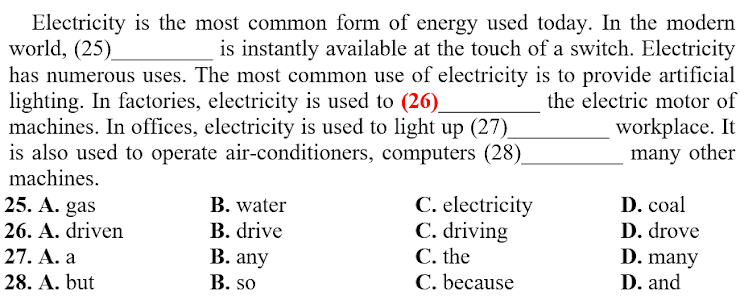Read the following passage and mark the letter A, B, C or D on your answer sheet to indicate the correct word or phrase that best fits each of the numbered blanks.
Schools exams are, generally speaking, the first kind of test we take. They find out how much knowledge we have gained. But do they really show how intelligent we are? After all, it isn't a (1) ______that some people who are very academically successful don't have any common sense? Intelligence is the speed (2) ______which we can understand and react to new situations and it is usually tested by logic puzzles. Although scientists are now preparing (3) ______computer technology that will be able to “read” our brains, for the present, tests are still the most popular ways of measuring intelligence.
A person's IQ is their intelligence as it is measured by a special test. The most common IQ tests are (4)______ by Mensa, an organization that was founded in England in 1946. By 1976, it had 1,300 members in Britain. Today there are 44,000 in Britain and 100,000 worldwide, largely in the US.
People taking the tests are judged in (5) ______to an average score of 100, and those who score over 148 are entitled to join Mensa. This works out at 2 percent of the population. Anyone from the age of six can take tests. All the questions are straightforward and most people can answer them if allowed enough time. But that's the problem, the whole point of the test is that they're against the clock.
Điền vào số (3)
A. advanced
B. forward
C. ahead
D. upper


Đáp án A
Câu hỏi từ vựng.
A. advanced (adj): hiện đại, tân tiến.
B. forward (adj): phía trước.
C. ahead (adv): phía trước.
D. upper (adj): phía trên cao.
Dịch: Mặc dù các nhà khoa học đang tiến hành chuẩn bị các máy tính có công nghệ tân tiến để có thể “đọc” được bộ não con người.